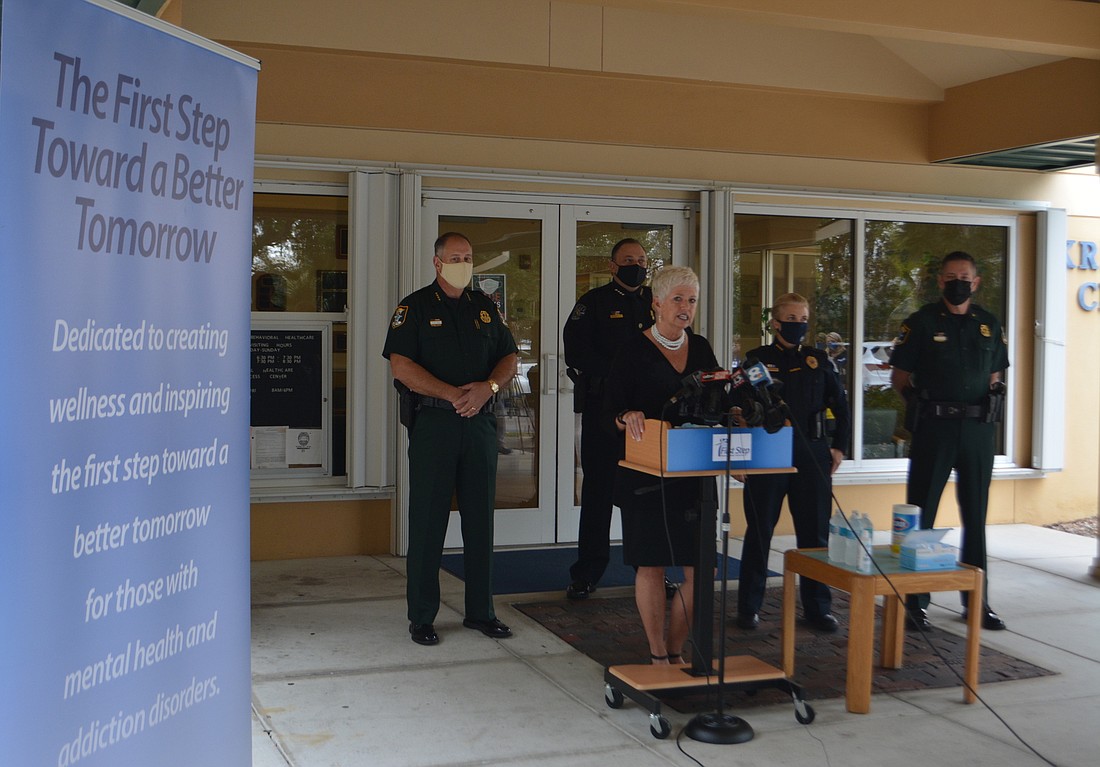- March 13, 2025
-
-
Loading

Loading

First Step of Sarasota has launched a pilot program intended to serve people with behavioral health needs while improving upon interactions between those individuals and law enforcement personnel.
At a news conference today, First Step CEO Gwen MacKenzie announced the formation of the Behavioral Health Response Team, an initiative created in partnership with the Sarasota County Sheriff’s Office and Sarasota Police Department.
MacKenzie said clinicians on the Behavioral Health Response Team will identify individuals who have experienced crises related to substance addiction or mental illness resulting in 911 calls and law enforcement intervention. MacKenzie said the team will work with those individuals and their families to create specialized safety plans designed to accommodate their specific needs.
MacKenzie said reaching out to individuals, partnering with people they trust and producing personalized strategies will help prevent more significant trauma and future emergencies that prompt a response from police or deputies.
“We hope this will be a community-based service where we meet people where they are and again upstream, at the earliest possible moment of anything they’re stressed by,” MacKenzie said.
The Behavioral Health Response Team will also share the information it gathers with the sheriff’s office and police department, helping reshape local law enforcement’s response to individuals experiencing behavioral health issues. Sheriff Tom Knight, who will take over as First Step CEO in January, and Police Chief Bernadette DiPino both expressed excitement about the program, which they saw as an opportunity to redirect issues related to behavioral health from law enforcement to professionals who specialize in that field.
Knight said the program offered a chance to take a proactive, preventative approach, reducing 911 calls and better serving individuals who have experienced crises in the past.
“They'll have a plan in place,” Knight said. “Their loved ones will care for them, making sure they're taking their medication, making sure they call a clinician if they don't feel right or family members start to see some deterioration, that it doesn't get to the point where the loved ones are just lost and all they have left is to dial 911."
DiPino said law enforcement agencies have taken on increased responsibility for behavioral health issues over the past several decades as governmental officials have decreased funding for mental health services. She said she’s long advocated for an alternative approach and applauded First Step for having the initiative to get a program started.
Although law enforcement will continue to respond to emergency situations, both Knight and DiPino said they thought the partnership with First Step would lead to improved long-term outcomes.
“With individuals, when we meet them … where they are, we can change their life and help them figure out what’s going on in their life,” DiPino said. “Which ultimately changes their world, their family’s world — which ultimately makes our community safer, makes our community better.”
MacKenzie said funding for the Behavioral Health Response Team pilot program came from the Gulf Coast Community Foundation and Barancik Foundation. Tracey Weeden, First Step’s chief inpatient and residential services officer, characterized the team as “small but mighty,” though those involved are eager to scale it up.
According to a document MacKenzie sent to City Manager Tom Barwin in September, First Step estimated the cost of the Behavior Health Response Team program at $84,908 for three months and $465,562 for a year. Although MacKenzie was optimistic about the prospect of securing funding if the program produces the results First Step expects, DiPino made an explicit call for additional resources.
“We need more money to be able to help expand this,” DiPino said. “This is the beginning. This is a pilot program. I see the success of it already; we would like to expand it even more.”
Weeden, who has experience putting together similar programs in three other states, said initiatives like this have a proven record of helping high-need individuals.
“Those served through these teams inherently want things to change,” Weeden said. “When provided with a resource like the Behavioral Health Response Team, we begin to assist them in making that change.”